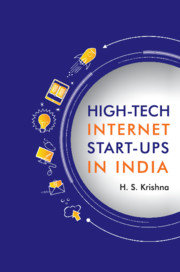Book contents
- Frontmatter
- Dedication
- Contents
- List of Tables
- List of Figures
- Preface
- Acknowledgements
- 1 Introduction
- 2 Objectives, Scope, and Methodology
- 3 High-tech Start-ups in India: Profile and Characteristics
- 4 Emergence of High-tech Start-ups
- 5 Survival of High-tech Start-ups
- 6 Growth of High-tech Start-ups
- 7 Factors influencing Life Cycle of High-tech Start-ups
- 8 Conclusions
- Bibliography
- Index
1 - Introduction
Published online by Cambridge University Press: 12 June 2019
- Frontmatter
- Dedication
- Contents
- List of Tables
- List of Figures
- Preface
- Acknowledgements
- 1 Introduction
- 2 Objectives, Scope, and Methodology
- 3 High-tech Start-ups in India: Profile and Characteristics
- 4 Emergence of High-tech Start-ups
- 5 Survival of High-tech Start-ups
- 6 Growth of High-tech Start-ups
- 7 Factors influencing Life Cycle of High-tech Start-ups
- 8 Conclusions
- Bibliography
- Index
Summary
Preamble
New and young businesses, referred to now as ‘start-ups’, have gained growing relevance and importance among the policy makers and leaders of economies worldwide. In particular, as the developed and developing economies make the transition to knowledge-based economies, the high-technology (high-tech) sector has been the primary engine in enabling this transformation. The promotion of high-tech start-ups helps economies to generate new products, services, and business models that differentiate the nations’ output from the rest of the world and enhances the economic progress of these countries (Saxenian 2002).
Therefore, the field of high-tech start-ups has been receiving much importance within the entrepreneurship literature from the 1980s. Gries and Naude (2008) observed that these new, small firms are more likely to grow (Johnson, McMillan, and Woodruff 2000; Lingelbach, de la Vina, and Asel 2005), create new jobs (McMillan and Woodruff 2002; Audretsch, Keilbach, and Lehmann 2006), and promote new and flexible organizational forms (Kim, Aldrich, and Keister 2006). In particular, small high-tech start-ups have been recognized as being the major drivers of job creation and innovation and thus economic growth (Birch 1979; Baumol 2002; Kirchhoff and Spencer 2008).
In the USA, the 1970s and 1980s had the most impact and contribution to employment and economy from high-tech start-ups. The advent of the Internet in the USA and incremental successes in the biotechnology industry disrupted the marketplace through the creation of new start-ups that leveraged these technologies to provide new products and services in ways that were not possible before. At its peak, these entrepreneurial companies contributed 20 per cent of US employment in the 1980s. Despite being in recession, between March 2009 and March 2010, 394,000 new businesses were formed, creating 2.3 million jobs in the USA (Mutikani 2012).
Even emerging economies have benefited on account of high-tech industry-based growth strategies. Taiwan's contribution to total domestic output from the high-tech sector increased from 9.7 per cent in 1980 to 28.5 per cent in 2003. South Korea's high-tech manufacturing contribution to the total domestic manufacturing output jumped from 9.6 per cent in 1980 to 21.5 per cent in 2003 (Commission on Strategic Development 2007). In India, an average of 400 new technology start-ups were created during 2009–2012 (Microsoft Accelerator India 2012).
- Type
- Chapter
- Information
- High-tech Internet Start-ups in India , pp. 1 - 23Publisher: Cambridge University PressPrint publication year: 2019



